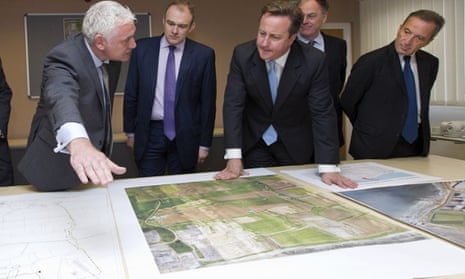Plans for a new generation of nuclear reactors in the UK have been dealt a fatal blow by Austria’s decision to launch a legal challenge to the EU’s approval of a £17.6bn subsidy deal, according to the Green Party.
On Wednesday, the Guardian revealed that Austria will appeal the EU’s decision last year to approve the subsidy deal between the UK government and EDF for Hinkley Point C.
Hinkley would be the first new nuclear reactor in Britain for two decades if built, although it would come with a price tag of £24.5bn and electricity generated from the plant would be paid double the market rate through levies raised on household energy bills.
But no final investment decision has yet been signed and legal delays now seem likely to prevent the government from realising its ambition for Hinkley to produce 7% of the nation’s electricity by 2023.
“I think that this [Austrian] court case is certainly going to delay the signing and also the construction of Hinkley,” said Molly Scott Cato, the Green Party MEP for the South West region, which includes Hinkley. “As one of the government’s main arguments for Hinkley was that it would solve the ‘energy gap’ before renewables could be brought onstream, it is a fatal blow to Hinkley as part of a future energy strategy for the UK.”
It was David Cameron who first described the signing of the Hinkley deal as marking “the next generation of nuclear power in Britain”, for its ability to meet energy demand and contribute to long-term security of supply.
Natalie Bennett, the leader of the Green Party, said that such claims now seemed risible. “I think we have seen the final generation of nuclear power, I am very pleased to say,” she told the Guardian. “It’s gone, it’s dusted. Lets focus on evidence-based renewables and energy conservation futures.”
Lawyers say that while a court case over the EU’s decision that the Hinkley subsidies were legal could take two years, the appeals process could drag proceedings on for substantially longer.
“A court process that kicks off in May would take a minimum of two years and if it goes into appeals, you’d then be looking at another two years. So it could be a minimum of three and a maximum of four years or longer,” said Dr Dörte Fouquet, a lawyer for the Brussels-based lawfirm Becker Büttner Held, which specialises in energy and competition law.
Austria’s chances of success were “pretty high,” she said, because there were no grounds for giving such state aid under EU treaty law and Austria would question the common European interest in building a nuclear power plant in the UK.
Part of the UK’s case, accepted by the European Commission, is that nuclear energy is entitled to state aid as a ‘market failure’ because no private sector investment would be feasible until 2030 at the earliest. The premium offered to EDF is thus considered “reasonable” in light of potential risks, and because the state aid involved would not confer any additional advantages to the company.
‘The UK is confident that the state aid case for Hinkley Point C is legally robust and we vigorously support the European Commission’s defence of its decision last year,” a Department of Energy and Climate Change spokesman told the Guardian. “This brings us one step closer to seeing new nuclear as part of our future low carbon energy mix.”
“We have no reason to believe that Austria, or any other party, is preparing a case which has any merit,” he added. The Decc office did not respond to questions about the effect that a lengthy court case might have on cost over-runs or a final investment decision.
The renewables industry has bridled at what some see as double-standards in EU decisions last year denying state aid to renewable energy in Germany, while allowing it for nuclear in the UK.
“It’s puzzling why the European Commission has decided to have a set of rules for one energy source and entirely different set for another,” said European Wind Energy Association spokesman Oliver Joy. “If we want a level playing field for all energy forms in the EU then we need common standards that allow all technologies to compete on an equal footing.”
The Ukip MEP and energy spokesman, Roger Helmer, offered strong support for nuclear energy, qualified only by a caveat that the government’s Hinkley deal had been “excessively expensive” because of regulatory uncertainty from Brussels.
“Given that Hinkley is a trailblazer for the new generation of nuclear and now looks like being held up for a long period of time, it will be extremely damaging - not just for nuclear but across the whole spectrum of industry,” he said.

Comments (…)
Sign in or create your Guardian account to join the discussion